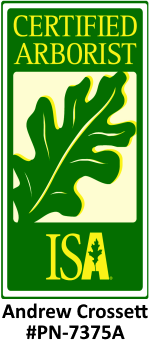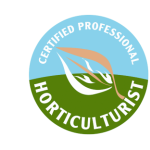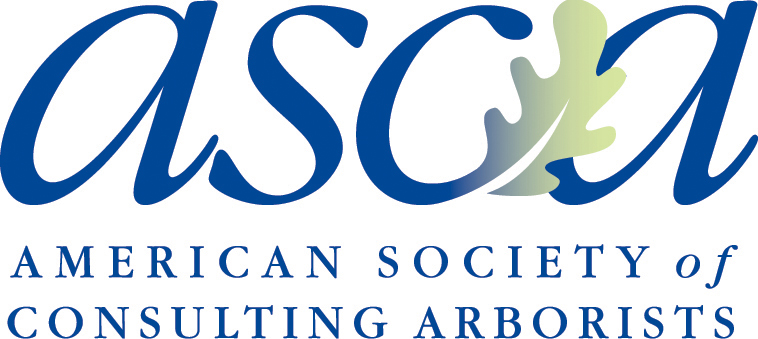Tree Frog LLC
Tree Frog LLC is an ISA certified consulting arborist business, located in Duvall Washington, that is dedicated to skilled, professional, and sustainable horticultural services. Owner, Andy Crossett, is a certified arborist and qualified tree risk assessor through the International Society of Arboriculture, a Certified Professional Horticulturist through the Washington State Nursery and Landscape Association, and has a degree in Environmental Horticulture, with 20 years of practical experience in the field.
What is a Consulting Arborist? - A consulting arborist is the authoritative expert on trees. They bring an objective and comprehensive viewpoint to their clients, ensuring the safety, health, and preservation of trees. For one to be considered a consulting arborist, they should have a degree in one of the following studies: environmental horticulture, arboriculture, urban forestry, plant pathology, entomology, forestry, or plant biology. Additionally, a consulting arborist should be certified through the International Society of Arboriculture and qualified as a tree risk assessor, or a member of the American Society of Consulting Arborists.
When to contact? - If you suspect a tree on your property is potentially hazardous, unhealthy, or diseased and want a qualified and objective opinion, then you will want to contact an independent consulting arborist, like Tree Frog LLC, that is not associated with a tree cutting/removal service. Remember that tree removal can be expensive and tree services make money removing trees. Unethical tree service companies may push for unnecessary tree removals or outdated pruning methods that could potentially increase the likelihood of failure of trees and their parts. An independent consultant will give you an honest and objective risk rating or health assessment of a tree, allowing tree owners and risk managers to make informed decisions concerning the future of their trees.
If you would like to remove a tree from your property, it is always best practice to know the local municipal and county tree codes. A permit, or in the very least, notification, is typically required. Remember, unless specifically stated, a tree service is not required to apply for or make sure the job is permitted, it is the responsibility of the tree owners and risk managers to make sure they have all applicable permits before work has started. Failure to follow municipal rules for tree removal can lead to penalties or fines. A Consulting Arborist can help you navigate this process, provide a report, apply for the permit, and provide guidance about any replanting requirements that may be required.
SERVICES
Consulting - I can help you identify the trees on your property, assess their health and identify potential risk, and make recommendations based on experience and education. This can be either through a verbal or written assessment.
Tree Risk Assessment - Trees are a vital asset to our homes and communities. However, in some situations, a tree may pose a significant risk to people and property. It is important to work with an ISA qualified tree risk assessor to help develop a plan to minimize those risks and evaluate whether or not a tree is a hazard and will need to be removed.
An ISA qualified tree risk assessment promotes the safety of people and property by providing a standardized and systematic process for assessing tree risk. The results of a tree risk assessment can provide tree owners and risk managers with the information to make informed decisions to enhance tree benefits, health, and longevity.
Tree Inventory Reporting - During pre-construction site planning, many municipalities will require an inventory report of the trees on site. A Tree Frog LLC tree inventory report will include all required information and will make recommendations based on city ordinance.
Services Also Include - Written arborist reports, development site planning, tree protection and removal plans, replanting plans, permitting, navigating municipal and county tree code, and general environmental consulting.
Andy Crossett - Consulting Arborist
Certified Professional Horticulturist, ISA Certified Arborist,
ISA Qualified Tree Risk Assessor
My career in the horticulture industry began in 2002 at a local landscaping company in Bellevue, WA. During the next few years, I continued to landscape with the goal of pursuing a formal education in the field. I graduated from the Lake Washington Institute of Technology in 2011 with a degree in Environmental Horticulture and completed the ISA and CPH exams to become a Certified Arborist and Certified Horticulturist, respectively. I then worked for the City of Bellevue's Street Tree and Irrigation department, and later went on to work as the head gardener at a large estate in Medina WA. I started Tree Frog LLC in 2013 and have been consulting full time since 2017.
Currently, I am the Tree Consultant for the City of Medina, and I continue to do tree reports for a number of regular clients in the area.
In my spare time, I enjoy spending time with my family and the animals on my small hobby farm.
Lake Washington Institute of Technology – Associates Degree, Environmental Horticulture
My education from Lake Washington Institute of Technology's horticulture program focused on the following areas of study: botany, plant propagation, greenhouse management, soils, pruning, pest and disease management, landscape design, turf grass management, and plant identification.
Certified Professional Horticulturist through the Washington State Nursery & Landscape Association #2537
In 1978, WSNLA created a two-pronged professional certification program that was known as the Washington Certified Nurseryman or Washington Certified Landscaper. In 2005, WSNLA revamped and upgraded the certification program and renamed the designation as Certified Horticultural Professional. With nearly 400 Certified Professional Horticulturists, the CPH program is the largest community of state certifications serving professional horticulturists in Washington State.
To earn a WSNLA Certified Professional Horticulturist credential, you must pass a written exam that tests your skills and knowledge as a horticultural professional based on study materials and practical applications.
You must provide the equivalent of one year of work experience (2000 hours) with a licensed nursery, landscape contractor or WSNLA-approved business or institution.
Certified Arborist and Qualified Tree Risk Assessor, through the International Society of Arboriculture #PN-7375A.
To earn an ISA Certified Arborist® credential, you must be trained and knowledgeable in all aspects of arboriculture. ISA Certified Arborist® have met all requirements to be eligible for the exam, which includes three or more years of full-time, eligible, practical work experience in arboriculture and/or a degree in the field of arboriculture, horticulture, landscape architecture, or forestry from a regionally accredited educational institute. This certification covers a large number of topics giving the candidates flexibility in the arboricultural profession. A code of ethics for ISA Certified Arborists® strengthens the credibility and reliability of the work force. This certification is accredited by the American National Standards Institute, meeting and exceeding ISO 17024.
Member, American Society of Consulting Arborist
ASCA represents Consulting Arborists—the authoritative experts on trees, and whose objective, comprehensive viewpoint ensures the safety, health, and preservation of trees. Our members’ extensive level of knowledge and experience makes them highly sought after by consumers, professionals, and other arborists.
To be an ASCA member, you must have at least five years of experience in arboriculture plus one of the following educational requirements: 1. Possess a four-year degree in arboriculture or a closely related field, such as urban forestry, horticulture, plant pathology, entomology, forestry, or plant biology. 2. Be a Board Certified Master Arborist. 3. Have a minimum of 240 approved CEUs.
Trees and the Law | Report Writing for Arborists | Defensible Tree Appraisal | Developing Field Assessment Skills for Common PNW Tree Diseases | Climbing Safety Case Studies | WSNLA PROseries seminar Pest & Disease | Tree Disorder Diagnosis Online Workshop & Live Discussion | Why Trees Fail Online Workshop & Live Discussion | Arbor Chat: A Deep Dive Into the ISA Certified Arborist® Code of Ethics | Diagnosis & Disorder: General Diagnosis | Tree Biology: Anatomy | Arbor Chat - Coronet cuts: The simulation of natural fractures | Tree root physiology and urban soils – can’t we just all get along? | Arboricultural Zombies - Myths That Will Not Die | Forged in Fire: Arborist Options Before & After the Fire | Forest Health Watch – working together to monitor, study and understand tree health issues in Pacific Northwest | Tree insect pest diagnosis and management | Homeowner knowledge and perceptions of tree care and preservation on residential properties | Managing the Trees Where People Live for Resiliency | Regenerative Pruning: Research on Overextended Trees, Practice on Hollow Trees | Machine Generated Report Writing | Tools We Use | Putting the MD Back in Tree Doctor | Building a Resilient Arboriculture and Urban Forestry Program in Rural Municipalities | Ethical Tree Care in the Urban Interface | What’s pesky in the PNW… And what could be on its way? | Coping with heat: Community urban forest perspectives and experiences in Vancouver, Canada | Advancing Urban Forestry in the Pacific Northwest | Root Pruning | The Influence of Abiotic Factors on Street Tree Condition and Mortality in a Commercial-Retail Streetscape | Arborists and Wildlife: Retaining Trees for Wildlife Habitat | Tree Inventories | Biology and Identification of Fungi | Wood Decay Fungi Identification and Management | Container Type Affects Root Development | Tree Lightning Protection Systems | Advanced Tree Identification | Wood Chips and Compost Improve Soil Quality and Increase Growth of Acer rubrum and Betula nigra in Compacted Urban Soil | A Review of Spatial Variation of Allergenic Tree Pollen | The Cost of Not Maintaining the Urban Forest | Impacts of Wire Basket Retention and Removal | Effects of Root Severance by Excavation on Two Urban Tree Species | An Introduction to Arboricultural Biomechanics: How Arboricultural Practices Influence the Likelihood of Failure | Virtual Event Flashback: Quantifying Climbing Efficiency | Tree Stability Management: Monitoring & Treating Growth Forms and Faults. | Rules of Effective Community Engagement in Urban Forestry | Extension Agents' Perceptions, Practices, and Needs of Urban Forestry | Green Enough? Comparing Urban Forest Access to Resident Preferences. | Are trees always good? Ecosystem disservices and urban forests | Planning and managing green cities for human health and well-being | Socio-political Drivers of Urban Tree Diversity and Composition: Development, Symbolism, and Stratification | Urban Tree Inventories - The A-Z of counting trees | Bat Sheet Crazy - How Sheet Mulches Damage Soil and Tree Health | The Skilled Professional: Arborists and Urban Foresters' Engagement in the Non-Profit Sector | Plant Diagnostics – Beginning Inspection of the Hidden 50% | TCIA Certified A300 Writing Pruning Specifications 3/6/24 - 3/6/29 | The Urban
Forest Myth




